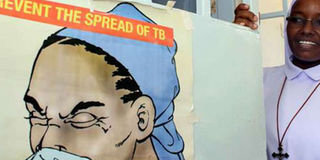Kenya to contribute Sh500m in Aids, TB and malaria fight

Sister Veronicah Wanjiru displays a message at Mbungoni Catholic clinic in Mombasa on February 26, 2016 that calls for the fight against TB. Kenya has planned to contribute towards the fight against the disease. PHOTO | JOSEPH KANYI | NATION MEDIA GROUP
What you need to know:
- Canada increased its own contribution by 23 per cent to CAD$804 million, with many new partners making first-time pledges.
- Running the seventh largest Global Fund portfolio, Kenya is expected to receive more than Sh34 billion from the Global Fund in the next three years.
Kenya has announced it will donate $5 million (Sh500 million) to the Global Fund to fight Aids, tuberculosis and malaria as other international donors pledged over $12.9 billion for the next three years to help end the epidemics.
Kenya's pledge at the launch of the Fund’s fifth replenishment made it one of the highest contributors from Africa.
The replenishment conference was hosted in Montreal, Canada, between September 16 and 17 by Prime Minister Justin Trudeau, who said there was a need to engage the youth in order to succeed in global health.
Canada increased its own contribution by 23 per cent to CAD$804 million, with many new partners making first-time pledges.
At the same time, private sector contributions more than doubled.
The Kenyan government donation is part of the concept of "giving to receive" that requires countries that benefit from the global fund to also make contributions.
Last year, Kenya pledged $2 million (Sh200 million).
Running the seventh largest Global Fund portfolio, Kenya is expected to receive more than Sh34 billion from the Global Fund in the next three years.
Other countries from Africa that made contributions to the Fund include South Africa ($5 million) and Namibia ($1.5 million).
“We can end these epidemics for good if we accelerate our efforts and continue to bring in new partners,” said Mr Trudeau.
Global Fund financing comes primarily from the public sector, with approximately 95 per cent of total funding coming from donor governments and the remaining 5 per cent coming from the private sector, private foundations and innovative financing initiatives.
More than 50 donor governments have contributed to the Fund, with a total of more than $30 billion.
As a public-private partnership, the Global Fund organises a resource mobilization programme every three years for private sector and non-government partners to make contributions to the fund, which is used in financing HIV, tuberculosis and malaria programmes across low- and middle-income countries.
The resource mobilization is made through funding contributions in a three-year cycle known as “replenishment”.
BIGGEST GIVERS
Among the largest contributors are the United States, which pledged $4.3 billion, approximately one-third of total funding, the United Kingdom with £1.1 billion and France €1.08 billion, maintaining its position as the second-largest donor to the Global Fund overall.
Germany pledged €800 million, (a 33 per cent increase from its previous pledge), Japan pledged $800 million, while the European Commission pledged €470 million.
At the same time, the Bill & Melinda Gates Foundation pledged $600 million and Australia A$220 million.
Pledges from private donors and innovative financing initiatives reached $250 million.
“The Global Fund is one of the most impactful investments a donor can make in global health,” said Bill Gates, co-chairman of the Bill & Melinda Gates Foundation.
“The increased generosity pledged by long-standing and new donors is inspiring and will help ensure this unique partnership can continue its critical work to make the world better, safe and more equitable for all.”
Ending the epidemics requires stronger systems for health, and breaking down the barriers that prevent people from accessing life-saving healthcare.
“We have the knowledge and tools to end HIV, TB and malaria as epidemics by 2030, but we need to invest smartly and with focus to make it happen,” said Mark Dybul, executive director of the Global Fund.
“When we work together, we can achieve more than anyone dreamed possible.”
Edited by Philip Momanyi





